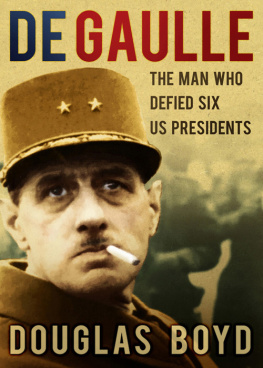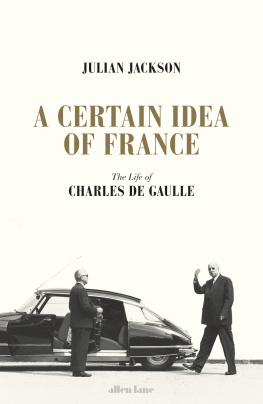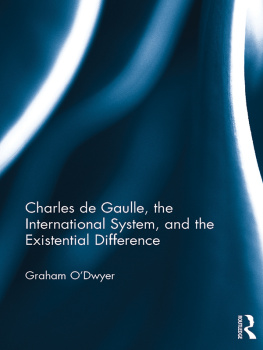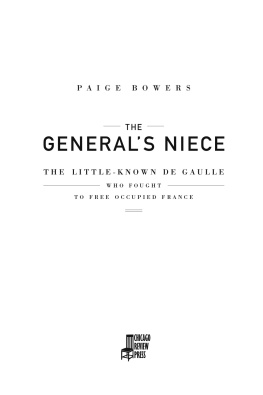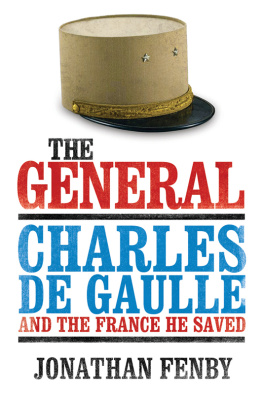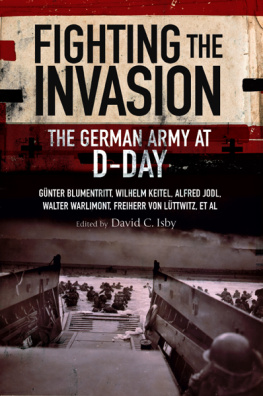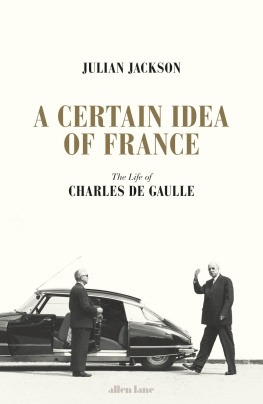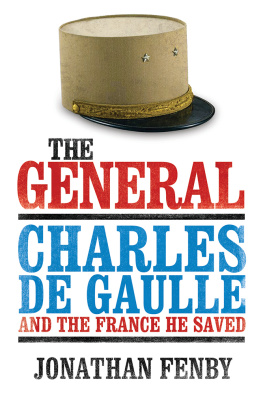CONTENTS
My thanks for help in researching this book are due to Monsieur Alexandre Cojannot, Conservateur du Patrimoine in the Archives of the Ministre des Affaires Etrangres in Paris; to fellow BBC pensioners Don Craven, Patrick Gerassi, Brian Johnson, Pierre Lesve and especially John Heuston for helping me correct many inaccuracies in previously published accounts of de Gaulles early broadcasts from London; to John Yeowell for digging into his memories of serving in the Foreign Legion in 1940; to Louis Henry, who served with de Gaulle in Africa and Italy; to researcher extraordinaire Joan Goodbody in Washington, who unearthed for me documents for some reason not obtainable in Europe; and especially to the resources of the Fondation Charles de Gaulle in Paris.
In Washington, Alix Sundquist generously took the time to read the entire first draft and gave me the priceless benefit of her long years experience in the US Foreign Service including the three years when she was probably the most popular and effective US Consul-General ever in Bordeaux. This should not be construed to mean that she in any way approved the book, for we agreed to differ on a number of points.
At The History Press I would like to thank my commissioning editor Mark Beynon and Lindsey Smith for her eagle eye as senior editor, plus Emma Wiggin as proofreader. Also thanks to designers Martin Latham and Katie Beard.
With all their help, it follows that any remaining inaccuracies are mine.
| ACC | Allied Co-ordination Committee |
| AFTAC | Air Force Tactival Application Centre |
| ALN | Arme de Libration Nationale |
| ALSOS | code name for US nuclear intelligence teams during Liberation |
| AMGOT | Allied Military Government of Occupied Territories |
| BCRA | Bureau Central de Renseignements et dAction Gaullist intelligence organisation in London |
| BST | British Summer Time |
| CEA | Commissariat lEnergie Atomique |
| CFLN | Comit Franais de Libration Nationale |
| CIA | Central Intelligence Agency |
| CNR | Conseil National de la Rsistance |
| CRS | Compagnie Rpublicaine de Scurit |
| DBLE | Demi-Brigade de la Lgion Etrangre |
| Defcon | Defense Condition |
| DST | Direction de la Surveillance du Territoire |
| FFI | Forces Franaises de lIntrieur |
| FLN | Front de Libration Nationale |
| FO | British Foreign Office |
| FTP | Franc-tireurs et Partisans Communist Resistance organisation |
| GDR | German Democratic Republic |
| GPO | General Post Office the British postal system |
| GPRF | Gouvernement Provisoire de le Rpublique Franaise |
| HUMINT | human intelligence, i.e. spies |
| ICBM | intercontinental ballistic missile |
| IRBM | intermediate-range ballistic missile |
| MAD | mutually assured destruction |
| MMFLA | Mission Militaire Franaise de Liaison Administrative |
| MRBM | medium-range ballistic missile |
| MRP | Mouvement Rpublicain Populaire |
| MUR | Mouvements Unis de la Rsistance |
| NASA | National Aeronautics and Space Administration |
| NATO | North Atlantic Treaty Organization |
| N-PIC | National Photographic Interpretation Centre |
| NSA | National Security Agency |
| NSDM | National Security Decision Memorandum |
| OAS | Organisation Arme Secrte |
| OSS | Office of Strategic Services |
| PCF | Parti Communiste Franais |
| REI | Rgiment Etranger dInfanterie |
| REP | Rgiment Etranger de Parachutistes |
| RPF | Rassemblement du Peuple Franais |
| SAC | Strategic Air Command |
| SACEUR | Senior American Commander in Europe |
| SD | Sicherheitsdienst |
| SDECE | Service de Documentation Extrieure et de Contre-Espionage |
| SHAEF | Supreme Headquarters, Allied Expeditionary Force |
| SHAPE | Supreme Headquarters, Allied Powers in Europe |
| SIGINT | signals intelligence, i.e. interception of broadcast transmissions |
| SOE | Special Operations Executive |
| UDR | Union des Dmocrates pour la Rpublique |
| UNR | Union pour la Nouvelle Rpublique |
| USAF | United States Air Force |
| USAFSS | United States Air Force Security Service |
| USIA | United States Information Agency |
| WAAF | Womens Auxiliary Air Force |
President Roosevelt won domestic support for US involvement in the European war by his intention to make neutral France a protectorate run by an Allied Military Government of Occupied Territories (AMGOT) like the eventually conquered enemy states of Germany, Italy and Japan. This American-dominated government would have abolished all sovereignty, including even the right to print money.
History Professor Annie Lacroix-Riz, quoted in Le Monde diplomatique,
May 2003
In the early evening of 9 November 1970 Charles de Gaulle was playing a game of patience on a small card table a few paces away from the writing desk in his modest home at Colombey-les-deux-Eglises in the Champagne region of France where he had spent the day working on his memoirs. Falling to the floor with a massive internal haemorrhage from the rupture of an aneurysm in the abdominal aorta, he died instantly, two weeks short of his eightieth birthday.
The world awoke next morning to the loss of a great man and a great European. French President Georges Pompidous broadcast tribute expressed what most of the nation was feeling, including those people who had voted against the man known simply as le gnral on every possible occasion. General de Gaulle is dead, he said solemnly. France is a widow.
In adversity Charles de Gaulle had been arrogant, demanding and infuriating for his allies. Harold Macmillan called him the almost impossible ally. In power, he could be gracious, but also autocratic and inflexible, earning the undying hostility of US President Franklin D. Roosevelt and FDRs five successors. Few had loved him, but millions had respected his integrity, as witness the flood of tributes from all over the world, including many who had been his ardent critics in France and abroad. The consensus was that he had saved his countrys honour in 1940; in 1945 he had restored the countrys independence, despite Roosevelts plan to impose a military occupation on neutral France, as though it were a defeated enemy belligerent; and in 1958 he had saved the nation from civil war for a second time. The one jarring note in the media a mocking article in a French satirical weekly was the object of public outrage so widespread that the magazine Hara Kiri fittingly committed suicide and ceased publication.
To President Pompidou, US President Richard Nixon wrote, I was profoundly upset and saddened by the death of General de Gaulle. My country considered General de Gaulle as a faithful ally in time of war and a true friend in time of peace Greatness knows no national frontiers, and consequently the loss which France has undergone is a loss for all humanity.
Charles de Gaulles wartime partner Winston Churchill died in January 1966 and the heartbeat of the British nation stopped for a moment. Few think of him now, for that is the fate of the great who rise to their destiny for one particular task, and are later an embarrassment in their decline. Franklin D. Roosevelt, too, is historys dust, except in the US, where his record in combating poverty and social unrest after the Depression keeps his memory on a level with that of Presidents Washington, Jefferson and Lincoln. Josef V. Djugashvili, aka Stalin, has almost been written out of the history taught in the schools of the many subject peoples his armies and political police terrorised for decades. But de Gaulle lives on in France, for without him it is very possible that Britains nearest neighbour in the new Europe would have been inadvertently destroyed by Roosevelt in 1945. In the French presidential elections of May 2007, the victorious candidate Nicolas Sarkozy evoked Charles de Gaulles name in the early stages of his campaign to gain votes, as his predecessor Jacques Chirac did many times in each case by implying that he was in some way the political heir of the man they call simply

